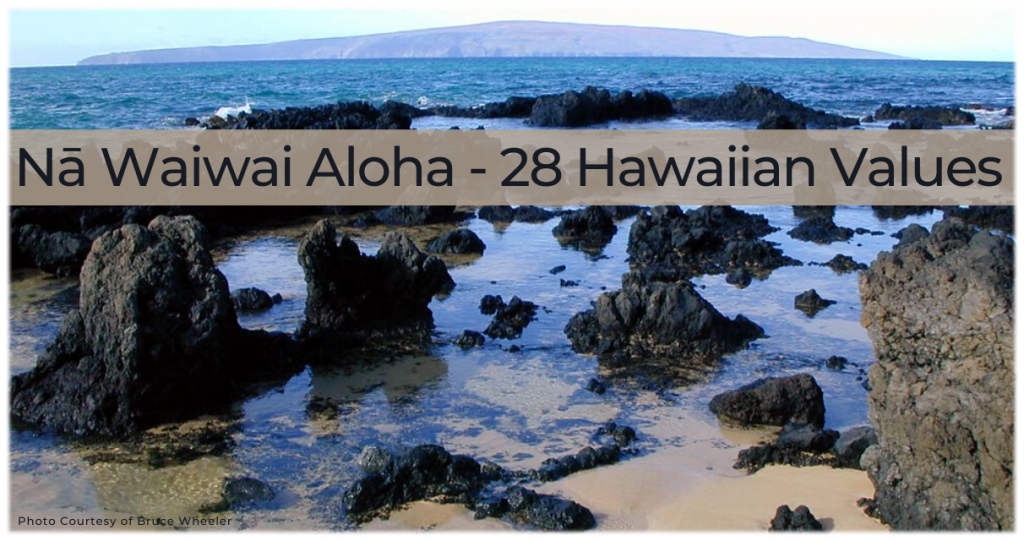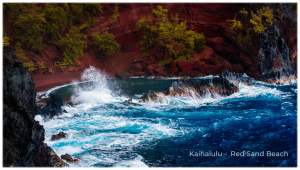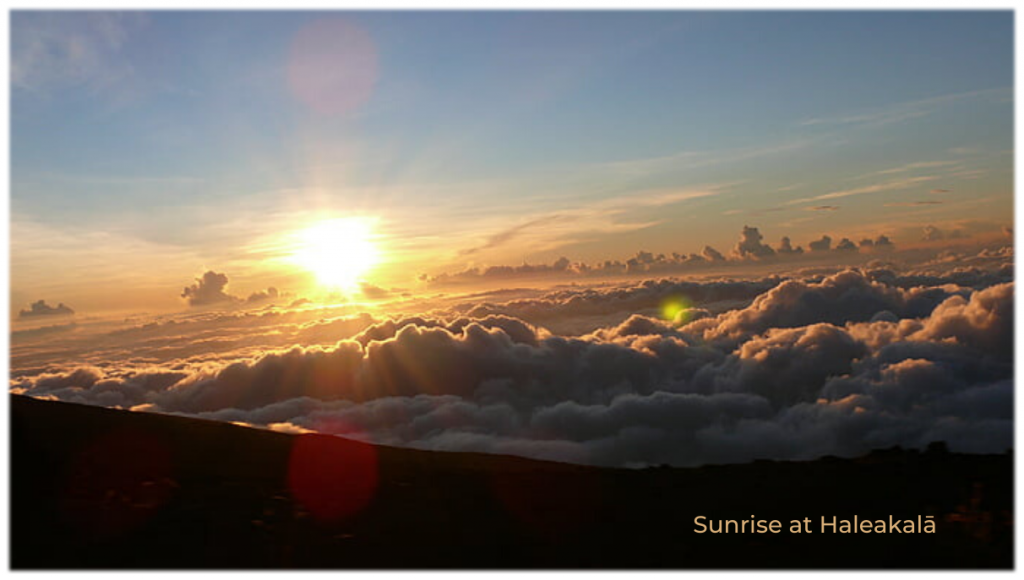 Hawaiian Values are, in essence, values for humanity.
Hawaiian Values are, in essence, values for humanity.
Their uniqueness comes from being expressed in a pure, pristine way. Even though they were inherited from ancient Polynesian Culture and an environment that is temperate to tropical, they still speak to the values we have today worldwide.
People living together on this small planet must have values to survive and thrive.
It makes no difference if your life revolves around a job in a city or fishing from the sea for your livelihood. In either location, you will be interacting with other people, building relationships, and making a variety of connections. This is what we do as a society, a community, and a civilization. Our values are what guide us in ways appropriate to our culture and our environment.
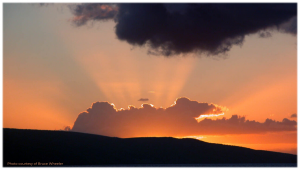
The Hawaiian Values we are going to share with you are for our daily life.
They will guide what choices we make. Choices are made when interacting together as spouses, parents, children, friends, family, tribe, community leaders, and the community as a whole.
The Polynesians who became the Hawaiians had a different approach from the people of the Western world. They took what they knew of unwritten rules and codified them. This knowledge was put into stories, protocols, chants, and songs, which were passed down through the generations. They understood that:
Your values tap into an inner source of profound knowledge and strength: Your Aloha Spirit.
As you learn about Hawaiian Values, you will find all of them very important. This compilation of Hawaiian Values has evolved through many generations and experiences.
With there being so many foundational and fundamental values, it is hard to pick one or even two which could be called the Core Values.
Each day brings different circumstances.
Therefore, each day depends on the events and tone of that day. And that tone will dictate which Value will resonate with you and become the guiding light in your actions and responses.
In general, when speaking of a community’s values, we will always come back to one of the most crucial aspects of any society, which is how we treat one another.
 The value called Pono speaks straight to the heart of this all-important concept of how we treat one another.
The value called Pono speaks straight to the heart of this all-important concept of how we treat one another.
In Pono, we have the value of integrity and harmony, guiding us to do the right thing. If we know that our community members are acting authentically with integrity and balance, then deep trust can flourish within the community.
When there is trust, the community is at peace.
This harmony serves as the foundation for another essential value known as Laulima – all hands working together. Everyone is willing to do what it takes. Even go beyond the requirements because they feel everyone is in this together.
Another value that parents stress when they are guiding their children in how to live a Pono life is the value of Kuleana.
Kuleana is a personal sense of responsibility and accountability.
Sound familiar? Isn’t that what we want everyone to have? In Hawai’i, we often hear the phrase, “that is your Kuleana,” meaning that it is the responsibility you have chosen, or you have agreed to fulfill. We are counting on you to accomplish it. When our family and community members are fully accountable for their individual responsibilities, living Pono becomes a natural byproduct.
Before we dive into our list of 28 Na Waiwai Aloha, let’s take a moment to understand them more.
An excellent way to understand the context in which these values evolved into the guiding principles of early Hawaiian life is the way Hawaiians divided up their resources – their lands, water, and shared responsibilities. We can see all of this in the concept of the Ahupua’a. Ahupua’a are the land divisions Hawaiians created to expertly manage the use of each island’s resources in order to provide for their island communities in a sustainable and just way.
The ahupua’a, of which there were many, consisted of a slice of land that started at the top of the mountains and extended down to the sea.
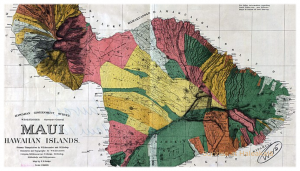
This way of using the land created a lifestyle where Hawaiian families depended on one another and shared the fruits of their labor. The fruits of the forest were shared and exchanged for the fruits of the sea.
In early Hawai’i, people living in one ahupua’a would ask permission from another ahupua’a before taking their resources. The system of checks and balances (Hawaiian Values), coupled with a deep spiritual relationship with the land and sea itself, ensured that resources were managed appropriately and efficiently. This was done for the good of everyone in the village.
In the past, the ahupua’a lifestyle worked because everyone had a clear understanding of their Kuleana.
Each family member understood and contributed their own responsibilities, and they expected the same from others.
This system of duty-bound sharing was understood by everyone, and thus everyone was well cared for at all times.
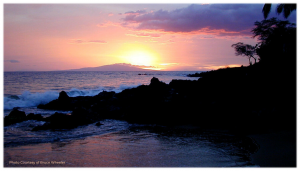
We all have had the feeling that there is something very unique and special about the Hawaiian Culture.
This culture and the system of values that have evolved over the centuries have guiding principles that developed organically. These principles and values grew out of people learning to thrive in one of the most beautiful, most remote island chains in the world. Their values reflect the beauty and love they felt coming from the land.
And they instinctively knew how to blend and merge with these islands using their values and their native intelligence.
So when we feel a special moment, we can thank those generations of people before us who merged with this natural beauty and the challenges they faced to blossom into a culture totally unique in our world. The culture of Aloha.
Writing and graphic creation by Sugandha Ferro Black
Na Waiwai (28 Hawaiian Values)
Akahai – Unassuming, non-arrogant, polite, pleasant, gentle, and modest.
Alaka’i – A strong leader, lead by a good example, you shall guide others when you have gained their trust and respect.
Aloha – Unconditional love, outpouring, and receiving of the spirit, a way of life, an attitude of expressing one’s happiness, joy, and gratitude for life. Also, in today’s island life, a greeting or farewell filled with love.
Enduring Patience
Ahonui – Enduring patience that is exhibited even during times of great stress and always with tenderness.
Ha’aha’a – Humility expresses in being humble, modest, and open in your thoughts. To be ha’aha’a is highly praised and respected.
Ho’ohana – To work with a heartfelt purpose.
Ho’ohanohano – To honor the virtue and dignity of others and conduct yourself with attention to respectfulness.
Ho’okipa – Hospitality of complete giving that welcomes guests and strangers with Aloha.
Never Give Up
Ho’omau – Perseverance to continue to persist and never give up.
Ho’o Ma’ema’e – Pure, clean, and to cleanse. Respect and honor of one’s body is an inspiration to others by example.
‘Ike loa – The importance of seeking knowledge and educating oneself. Never stop learning about the world around you and your own self-growth.
‘Imi Ola – Mission, purpose, and vision to seek life in its highest form.
Ka la hiki ola – “The dawning of a new day.” Each day is brand new and breeds optimism, hope, and promise. Encouragement to move forward and choose to take advantage of a new beginning.
 The Dawning of a New Day!
The Dawning of a New Day!
Kakou – All of us. Communication is inspired by the knowledge that we are all in this together.
Kokua – To help, and assist those who need kokua. Giving help strengthens relationships. If one receives kokua, they are more likely to give kokua.
Responsibility and accountability
Kuleana – A personal sense of responsibility and accountability. It is a life code for holding yourself accountable with the belief that if you seek personal improvement as a goal, you will be self-motivated to pursue it throughout your life. There is always room to grow.
Kulia i ka nu’u – Strive for the highest. Pursue personal excellence in all you do.
Laulima – Literally, many hands. An essential part of island life is that it develops, strengthens, and supports the community. Working together in cooperation.
Balance, unity, and harmony
Lokahi – Balance, unity, and harmony to all facets of relationships and daily living. The idea that our mind, body, and the universe are all connected with each other promotes group consciousness and the belief that harmony within a group or population will secure survival.
Mahalo – Thank you as a way of living. Live in thankfulness and gratitude for the richness that makes life so precious.
Maika’i – Good, wellness. Practiced to boost morale and create a healthy work and home environment. Praise for a job well done.
Stewardship
Malama – Stewardship. To care for, protect, nurture, preserve, and watch over. Focus on the needs and well-being of both the individual and the whole. Malama i ka ‘aina, care for the land, Malama i ke kai, care for the sea, malama i na keiki, care for the children, are fundamental Hawaiian values that are being introduced to the Western world.
Nana i ke kumu – Look to the sources of teachers, spirit, and your sense of place to find your truth.
‘Ohana – Family. ‘Ohana is a common foundation or structure of humanity. In the Hawaiian culture, one turns to ‘ohana for unconditional encouragement, support, and understanding. A human circle of complete Aloha.
‘Olu’olu – Agreeable and expressing oneself with graciousness and kindness.
Pa’ahana – Busy and hard-working. Always encouraged in any aspect of life and eager to create a sense of accomplishment and fulfillment dedicated to the future.
Pa’a ka waha – Observe and then act. The more you listen and observe the environment around you the more you learn and will be able to contribute when it is time for you to speak.
Pono – Integrity of rightness and balance. A way of life in which all people, relationships, and present situations are considered when making decisions.
Photos courtesy of paid-for or free sources unless otherwise noted, as in credit to Bruce Wheeler for these fantastic images.
